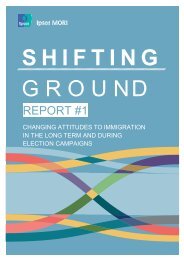Create successful ePaper yourself
Turn your PDF publications into a flip-book with our unique Google optimized e-Paper software.
Ties <strong>that</strong> Bind<br />
390 Ibid, p. 49.<br />
391 Her Majesty’s Armed Forces<br />
Application Form Guidance Notes,<br />
p.2 Available at:<br />
http://www.army.mod.uk/docume<br />
nts/general/AFCO_Form5-U.pdf<br />
392 http://www.raf.mod.uk/<br />
careers/canijoin/youcantjoinif.cfm<br />
393 http://www.royalnavy.mod.<br />
uk/careers/how-to-join/eligibility/<br />
394 Naval Personnel<br />
Management Handbook<br />
(September 2009) Available at:<br />
http://www.royalnavy.mod.uk/up<br />
load/package/68/br3book/ch06.p<br />
df<br />
395 Defence Vetting Agency:<br />
Framework Document (2006) p.4<br />
Available at: http://www.mod.uk/<br />
NR/rdonlyres/92C6679F-CAE5-<br />
442F-8D86-662AD926146C/0/dva<br />
_framework_document_2006.pdf<br />
396 Ibid, p.9<br />
84 | policyexchange.org.uk<br />
provides another powerful argument for updating recruitment processes and<br />
personnel monitoring through the assertion <strong>that</strong> ‘such specific policies and<br />
training are essential to protect the thousands of Muslim-Americans who serve<br />
honorably in the military from unwarranted suspicion arising from their<br />
religious practice’. 390<br />
The British armed forces have not pronounced as much on this topic as their<br />
American counterparts. The armed forces application form tells potential recruits:<br />
Your application will be rejected if you are (or have been) a member or supporter of – or<br />
associated with – any group or organisation whose purpose includes provocation to racial hatred<br />
and violence. 391<br />
Similar statements appear on the careers websites for the Royal Navy and Royal<br />
Air Force which respectively state, ‘Your application will definitely not be<br />
accepted if you’ve ever been, or still are, a member of a group <strong>that</strong> stirs up racial<br />
hatred and violence’; 392 and, ‘Your application will be rejected if you are, or have<br />
been, a member, supporter or associated with any group or organisation whose<br />
purpose includes incitement to racial hatred and violence’. 393<br />
It is not clear how the armed forces define ‘racial hatred and violence’, or by<br />
what standard a particular group will be deemed to be inciting or provoking<br />
others to it. In this respect, the threshold seems unduly narrow when compared<br />
to the apparently broader construction of ‘extremism’ put forward by the US<br />
Army. Some indication of the British armed forces’ thinking is given in the ‘Naval<br />
Personnel Management Handbook’, which states:<br />
a) Service life precludes membership or support for extremist groups or organisations whose purpose<br />
includes incitement to racial hatred and violence. The Naval Service has a ‘Zero Tolerance’ Policy<br />
towards racial discrimination or harassment and is determined to eradicate any racial behaviour<br />
within the Service.<br />
b) There are numerous such groups and organisations, e.g. COMBAT 18, with frequently changing<br />
names and objectives. Candidates, who, during the recruiting process, declare themselves members<br />
of such groups, have unspent convictions for racially motivated offences or express extreme racial<br />
views, are to be interviewed and rejected for lack of personal quali<strong>ties</strong>. 394<br />
Yes, ideas of racial superiority and purity may be inspired by European<br />
totalitarianism during the last century – but to define ‘extremism’ through such a<br />
narrow prism now overlooks the changing dynamics of extremist ideology and its<br />
agents in the twenty-first century. It ignores the broader set of normative British<br />
values <strong>that</strong> our armed forces are expected to protect, including legal and<br />
constitutional equality for all, which denies discrimination on the grounds of<br />
gender, sexual orientation, and faith. For so long as these factors are excluded from<br />
consideration, vetting procedures run the risk of missing potential extremists.<br />
All members of the armed forces are currently vetted by the Defence Vetting<br />
Agency (DVA). 395 Their role is to ‘provide an acceptable level of assurance as to the<br />
integrity of potential and serving civilian and military MoD employees and<br />
Defence Industry staff who will be, or are, given authorised access to sensitive<br />
Government information or valuable assets’. 396 To achieve this, different levels of<br />
security clearance apply in different circumstances, as explained by the DVA:



